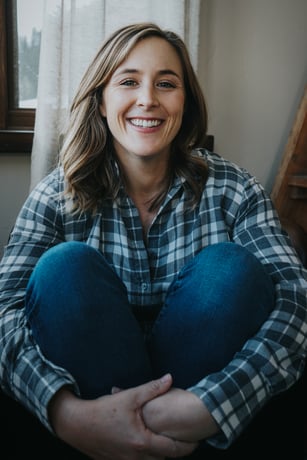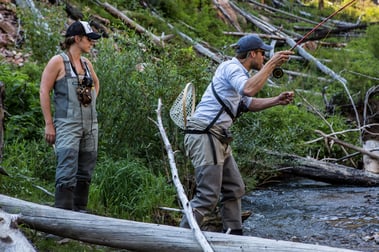Share this
Erica Mackey, Co-Founder and CEO, MyVillage
by Fundid on May 11, 2020
Erica Mackey is a serial entrepreneur who recently co-founded MyVillage. As CEO, Erica is building a high-quality, community-driven solution to the national childcare shortage by empowering home-based childcare and preschool providers with the tools they need to grow a successful business that puts kids and families first. MyVillage’s model mixes the best parts of franchising (quality, connection, support) with the best parts of a do-it-yourself startup business (freedom, control, independence).

Previously, Erica co-founded and was COO of Zola Electric (previously Off Grid Electric), the world’s first massively scalable off-grid electric company, connecting over 1 million Africans to affordable solar energy. Her ventures have raised more than $250 million from world-class investors including Tesla, Paul Allen, and others. She was a fellow at the Skoll Center for Social Entrepreneurship, and she has been recognized among Forbes 30 Under 30 Social Entrepreneurs (2012). She was a delegate for the Academy of Achievement (2014) and was awarded the Zayed Future Energy Prize (2015).
Q: If you were to explain who you are and what you do in a few sentences, what would you say?
A: I am an entrepreneur who leads from the heart. I love working on complex societal challenges. I have tackled public health and energy access challenges in Africa and I am currently working on solving the childcare crisis in the US.
Q: Tell me a little bit about MyVillage and who you serve.
A: MyVillage is an early childhood education startup serving the average American family. We have more than 100 educators across two states, Montana and Colorado. I founded the company with another mom and serial entrepreneur who like me, has young children. From the beginning, we’ve been on a mission to end the childcare crisis in the US. MyVillage makes it easy for educators to start and successfully run a home-based childcare business. We are a much-needed resource for working parents looking for affordable, exceptional child care options for infants, toddlers, and preschoolers. This won’t surprise any parents out there, but child care costs more than a public university in a majority of states, and most Americans reside in a “child care desert” where kids under 5 outnumber licensed spaces available in their area.
Q: I hear that you raised funding for MyVillage. So tell us a little bit about what it was like to raise funding, how you did it, and what your experience was.
A: We've raised a couple of different rounds and types of capital for MyVillage. We started off with a convertible note to prove our concept and better understand the potential product-market fit for our approach to tackling this crisis. We raised $1.2 million at that stage based on the market research we had done. We didn't have anything actually operational at that point, but we did have a strong track record of starting previous venture-funded companies and a strong network. We raised from a collection of angel investors and impact funds at that stage.
We then spent a year fleshing out the model, piloting, testing, tweaking, and making hypotheses around the initial concept to get to a place where we could raise seed money to actually scale out our initial concept. We raised what ended up being a $6 million round with that initial $1.2 million converting into it. A lot of the same investors participated in the larger round. We also brought in some new investors that had specific skill sets. Only one investor was local to Montana, and many of our investors are pretty global. We have folks from the Bay Area and New York, to one based in New Zealand, another who is Australia-based. Our board coordinates among six different time zones. The global support has been phenomenal to really test out MyVillage’s model, and it’s great to see a Montana company lead the rest of the country in an innovative way to tackle the child care crisis.
Q: How did you even come up with MyVillage, or why is this important to you? Why are you starting this?
A: My inspiration, without question, is my own children. I have a four-year-old, a two-year-old, and one whose arrival is four months away! I spent nearly a decade living in Tanzania, where I founded a company that brought clean solar energy to 1 million people. I brought my first daughter at six-week-old back to Africa, where I was trying to navigate through being a working mom, needing to find quality care and keep my business going. I landed in all of these capital cities, trying to use the internet to find quality options for my daughter’s care. As an entrepreneur, I kept thinking, why is this so hard? It felt like it was hard in every culture. I knew my needs were totally weird and that I was probably the only one that was needing short term care in all these different places. But that caused me to become really curious and start a series of conversations with tons of fellow working parents, which ultimately led me back to the US.
 I realized that parents don't really share about parent problems until you ask them directly, or until you're a parent yourself. For me, that was really where the MyVillage idea cracked open. I could not believe how challenging it was for the average American family to find quality care. It seemed like the trifecta of quality, affordability, and availability was unobtainable. Unless you got on a waitlist before you started thinking about conceiving, you had to compromise. That's heartbreaking. It’s just completely enraging. That was my impetus to start really trying to peel back the layers on why the child care system is so broken.
I realized that parents don't really share about parent problems until you ask them directly, or until you're a parent yourself. For me, that was really where the MyVillage idea cracked open. I could not believe how challenging it was for the average American family to find quality care. It seemed like the trifecta of quality, affordability, and availability was unobtainable. Unless you got on a waitlist before you started thinking about conceiving, you had to compromise. That's heartbreaking. It’s just completely enraging. That was my impetus to start really trying to peel back the layers on why the child care system is so broken.
Q: I know you know a lot of data on the childcare space. What are the few numbers or things you want to make sure people out there know about it?
A: First of all, there's a lot of money spent in this space. It is incredibly expensive to have a young child and go to work these days. About $48 billion dollar changes hands in the United States for kids ages 0-5 who are in paid care. That's just the formal market. It's estimated that the shadow market around that is probably three, four times that size of that. I think about the parents who are half-time at home swapping out, or who have a relative who watches kids part-time, or maybe they're paying a neighbor for windows of time that paid care does not cover. There is a ton of money being spent. While at the same time, more than half of the parents report that they are unhappy with their current option of care because of quality concerns.
In half the states, it costs more to send your child to childcare than it does to a public university college. Literally, tuition for college is less expensive than child care. In many states, there's just no availability for quality programs. So even if you could afford it, which most families can't, there isn't the option to send your kid to a place that you can have peace of mind and go back to work. This is known as a childcare desert, and more than half of Americans live in one. So in a place like Gallatin County here in Montana where we’re based, we have one of the most acute childcare deserts in the country. Only one in three kids have a licensed child care location to go to.
Q: Okay. Define, I kind of heard that, but I want you to define it again, what is a childcare desert?
A: A childcare desert means there is more demand than there is supply. There are more kids who need care than there are licensed spots to send those children to.
Q: Wow. Okay. Then people in childcare deserts that need childcare, what are some of the things they're resorting to as their solutions right now?
A: They'll resort to lower quality because most families require both parents to work in order to live. So they turn to informal, under-the-table situations, where care providers or educators may not be sufficiently trained in health and safety and the basics—which should be the bare minimum—let alone all the child development background that educators should have to engage with children of that age. They'll resort to putting their children in places that are not safe. They'll resort to scaling back work hours so they can work from home and try to piece that together. Anyone who has a child that is an infant or toddler and has tried to stay home and work at the same time knows it is not a possible solution.
However, when that's the only option, that's what people do. They will try to make swaps. So if there are multiple working families living in one neighborhood, they'll each take a day off work or work from home and then swap their kids around. So it increases logistics insanity and in many cases puts kids in danger because they're in situations where they're in environments that are not safe.
Q: Yes, amazing that you're doing this. I want to think back, this isn't your first company. You chose to be an entrepreneur somewhere along your path. So if you can think back to that time, what was it that caused you to become an entrepreneur?
A: I've had an interesting evolution of my career path. It hasn't always been so intentional; I’m driven by intuition. My parents seeded in me an entrepreneurial mindset from the very beginning. I came from a household where I'd say, "Oh, I just applied to Jamba Juice,” so I could work during high school. My dad would say, "Well, let's go to the bank and figure out how we can get a loan and buy a Jamba Juice and then you can learn how we can actually run the business."
My parents raised me to take what interested me and really own my career, drive it, and make the biggest possible impact and footprint possible. That was the mentality that I was raised in, to always come from a place of “yes.” That sense of possibility was embedded really early.
I also always leaned into opportunities that came up. I followed a path that first took me to being a chemical engineer, which then led me to doing academic research in ecology, which then led me to feel disconnected from human communities. What I loved about my ecology work was being in a complex community focused on asking complex questions to solve. That led me to public health, which led me to spend a lot of time in public health in Africa. That’s where I grew my “last mile” operational skillset, my execution skillset.
People I met there told me health mattered to them but always with the caveat that what they really cared about was their kids and making sure that their kids got the best possible start in life, which they defined as access to electricity. That led me to start Off Grid Electric, Africa’s largest solar company, which today is called Zola.
As an entrepreneur, I look at the problem that am I seeing, and think, how do I create a solution? For me, whether or not it is a market-based solution or a publicly-funded solution doesn’t matter as much to me as solving impactful problems.
Q: Wow. What a journey too. That's incredible. I love how it just kind of builds upon itself as it goes. So I know as entrepreneurs, not just female entrepreneurs, but entrepreneurs in general, we tend to be really hard on ourselves, at least I am really hard on myself. I'm just curious, in your own world, how do you define success for yourself?

A: These days, I primarily want to be a good parent. That is first and foremost. Interactions with my kids help me hold up a mirror to how I can be present for them. I think that that translates to the way I run a company and the way that I think about business as well. I went through a stage where I had to shift my mindset from valuing being busy to being productive. It's really allowed me to get to space where I've learned to create space to be present, whether that is as a mom, as a leader, or as an entrepreneur. To me, success is about focus and really being able to measure my impact in ways that I know are high priority areas, so that I know I'm doing really targeted and effective efforts. It's about doing less of more important things for me these days. While I have a lot of balls rolling at the same time, I feel like I have way more space in my life to be able to be successful at what matters, because I’ve shifted how I think about success.
Q: So when you're thinking about that then in your journey, what would you say is your biggest challenge right now?
A: My biggest challenge is constantly trying to improve my ability to deliver on that. To maintain my focus and ask if I’m focused on the right few things? Am I holding myself to a certain productivity level? Am I disciplined enough to stick to those and do those few things really well? That's an ongoing challenge that I'm constantly trying to be really humble in my approach to assessing if I am doing a good job at that. And I’m really trying to keep blinders on in that way to make sure that I'm not getting distracted.
Q: Thank you. That's a great answer. So thinking about your journey where you are right now, what you have ahead of you. What's the biggest reward of choosing the path of entrepreneurship for you?
A: There are so many rewarding things about being an entrepreneur. Sure, there are scary unknowns that come with being an entrepreneur, but on the flip side, there are so many rewarding things that come from being empowered choose an idea or an area that you want to tackle, focus on it, apply the right skill set to start to pull the problem apart in an actionable way. The reward for me is in the doing, meaning it truly is about the journey, not the destination. I think that ultimately seeing that skillset and that appreciation manifest in my children is ultimately the most rewarding idea. Like having Izzy, my four-year-old, sit down and think about starting a lemonade business or put together a business plan for ‘Storage Lemonade Stand’. I mean those are ridiculous things, but there are so much joy and fun in coming up with a name and thinking through ideas, just putting meat on the bones of your ideas together. Being able to lead by example is actually paying off in that way for my children, which is incredibly rewarding.
Q: One last question for you today. If you are in a community of peers, being other women business owners, what would you want to learn from them?
A: So many things! The one thing that's been on my mind recently for us, me as a leader and MyVillage as a business, is that there are a lot of benefits to having a very distributed workforce these days. This has always been a constant learning curve for me starting with the business that I had before with me being based in Africa. As a woman and as a woman leader, there's something that's really powerful about being in person with your team and being able to grow and evolve together. However, the nature of how my businesses have operated has required us to have nodes with very distributed operations. I’m interested in learnings around distributed teams, being able to share those tips that work, especially around how we keep that connection and the strengths that we have as women leaders but apply those into a distributed team. These are areas where I’m constantly learning and devouring new concepts.